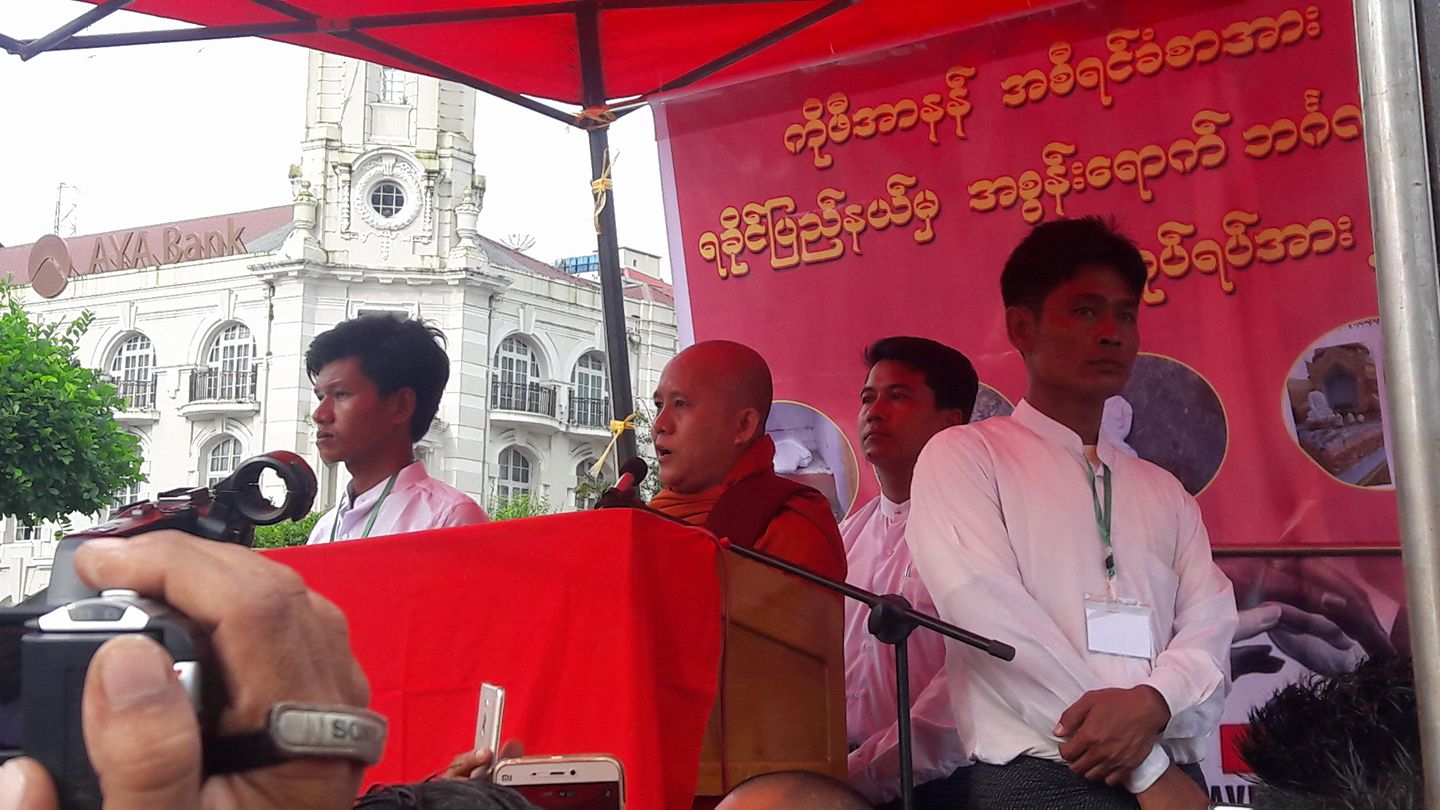The firebrand nationalist monk U Wirathu headlined a rally on Wednesday at which he spoke in dire terms of the “marauding” threat posed by Muslims in western Burma, labelled international aid groups operating there “terrorists,” and thwarted Buddhist authorities’ attempts to rein in his public profile.
“Maungdaw has fallen,” he proclaimed, speaking of the Muslim-majority township in northern Arakan State that is at the centre of the latest turmoil to engulf the state.
“The mob attacked the villages with explosives and the men could not counter them. The villagers had to flee their villages and sovereignty over Maungdaw region is at stake; at this rate, we will have to give the land to Bengalis,” he said, referring to self-identifying Rohingya Muslims by the term used by many in Burma, including the government of late, to suggest that they are illegal immigrants from Bangladesh.
In a speech that took aim not only at the persecuted Muslim minority, but also the National League for Democracy administration, the Rakhine State Advisory Commission chaired by former UN chief Kofi Annan and international nongovernmental organisations (INGOs), Wirathu called on the government to declare martial law in northern Arakan State.
“If martial law is issued and the civilians are protected, not only will the army bolster its reputation, the parliament and the government will do so as well,” he told a crowd of hundreds gathered in the shadow of Rangoon’s City Hall.
“As long as a military administrative order is not issued and a State of Emergency is not declared, Maungdaw civilians will continue to be marauded upon by the Bengalis. … The Tatmadaw commander-in-chief is the only person who can protect the lives and properties of Rakhine [Arakanese] ethnic people.”
The impassioned and at times incendiary rhetoric comes amid heightened tensions between Burma’s majority-Buddhist and minority-Muslim communities in the wake of last week’s deadly attacks on more than 20 police outposts in northern Arakan State by the Arakan Rohingya Salvation Army (ARSA).
The government says more than 100 people have been killed since the ARSA assault in the early hours of 25 August. That includes “scores of terrorists,” according to state media, but also 12 members of the security forces and at least 20 civilians. Over the past week, thousands have fled to Bangladesh or the relative safety of major towns in the region as ARSA militants and the state security forces’ counter-insurgency campaign raise fears on both sides of the religious divide.
In Arakan State and nationwide, Wirathu has been accused of fomenting anti-Muslim sentiment and of stoking tensions between Buddhists and Muslims that have simmered since violence between the two religious communities tore through the state in 2012. In March, Burma’s highest Buddhist authority, Ma Ha Na, slapped Wirathu with a one-year gag order on preaching Buddhist sermons, a sanctioning that did not appear to prevent him from delivering Wednesday’s provocative harangue.
Speaking to DVB on Thursday morning, a spokesperson for the Ministry of Religious Affairs and Culture described yesterday’s remarks as a “public speech,” distinguishing it from a prohibited religious sermon.
Those comments bore striking resemblance to a post on the Facebook account of Wirathu on Wednesday night.
“It is not preaching sermons. It is delivering a speech. It is not relevant to the ban on preaching sermons imposed by Ma Ha Na,” the post read.
Phil Robertson, deputy Asia director for Human Rights Watch, pointed out that Wirathu’s penchant for anti-Muslim invective goes back to the days of Burma’s former military regime — and even earned him a place behind bars under the junta.
“The Burma government continues to play political games with Buddhist versus Muslim relations, and part of that is looking the other way when Wirathu and other extremists use incendiary language that promotes hatred and justifies violence,” he told DVB on Thursday.
Wirathu’s speech also ratcheted up scrutiny on aid organisations operating in Arakan State, where for years Arakanese nationalists have accused them of providing preferential treatment to the Rohingya, more than 100,000 of whom have lived in displacement camps since the inter-communal violence of 2012.
“INGOs are the terrorists who came and destroyed Maungdaw,” the monk said.
[related]
The targeting of INGOs was not without a state-sponsored, albeit less inflammatory, antecedent that came as recently as this week: The government claims local and international NGOs have been a source of material support to ARSA, saying metal pipes and fertiliser brought in by aid groups for development purposes had been used by militants to help make improvised explosive devices. And late last month, the government announced the discovery of World Food Programme biscuits at what it described as a terrorist training camp in Arakan State’s Mayu mountains.
“What’s particularly worrisome is the kind of rhetoric that Wirathu has been using against the UN and international NGOs, identifying them as enemies of Burma, suddenly pops up on Aung San Suu Kyi’s State Counsellor Information Committee website,” Robertson said.



